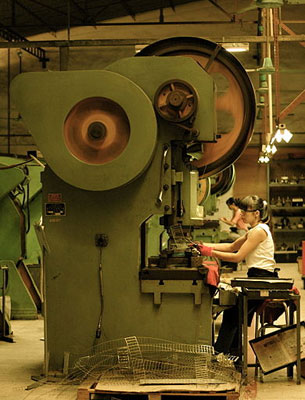A few weeks ago, I discussed the importance of EHS in the current Chinese job market. I outlined recent improvements that came about thanks to stronger domestic policy, the labor laws enacted at the start of 2008 and the reduction in production across the country caused by the global financial crisis. The new laws and greater government involvement in workplace safety is certainly having a major impact on the safety of many Chinese workers. However, unfortunately, for many major companies operating in China – both Chinese and international – providing workplace safety and meeting the standards put forth by the government may not be as easy as they would have imagined.

Photo: Taro Taylor
The problem does not lie in the direct enforcement of safety rules. Just visit the production facilities of any major company and you are likely to see a giant sign outside proclaiming just how long it has been since a ‘lost time’ workplace accident occurred and countless posters around the walls emphasizing the organization’s safety policies. Instead, the problem is more to do with indirect enforcement. I touched on this briefly in my last article when I described the amount of accidents that occurred in the mining sector, which provides much of the fuel for economic expansion here in China. However, it does not end there. Most major companies operating in China (and anywhere else in the world for that matter) will have a strong chain of suppliers and sub-contractors helping them produce their final product. It is the employees working for these companies that are far more likely to face safety shortfalls.
Of course, the majority of multinationals and major Chinese companies have strong policies in place designed to protect these workers. I have chosen two examples to illustrate this, Sony and HP (I have not done this to single these companies out for particular praise as there are countless other examples). Sony uses its Supplier Code of Conduct to ensure any company it does business with shows respect for its “employees health and safety, human rights and workplace environment”. Similarly, HP emphasized that its suppliers must show "responsible management and operational practices". Such statements sound great. However, many companies struggle to actually enforce them.
One of the companies with a strong policy on supply chain safety is US sportswear giant Nike, which employs – both directly and indirectly - 210,000 people in China. Back in 2003 it set an impressive precedent by setting up its Ziao Chen Worker Hotline, through which workers could ask questions on such issues as health and safety, labor contracts and wages. However, it is finding the high standards it sets on paper, hard to reach in practice. A report the company produced last year revealed that it was having problems with a staggering 180 manufacturers and suppliers. These problems centered on three areas (i) failure to adhere to Nike’s code of conduct, (ii) a lack of training and awareness, and (iii) poor communication of standards to the workers by suppliers. These shortcomings resulted in Nike finding 167 employees without the correct documentation and two workers below the minimum age of 18. And, those were only the violations they found.
Nike’s example may sound serious enough. Yet, it is nothing compared to that of Disney and the case of Liu Pan. 17 year-old Liu was killed at a factory in Dongguan in April of this year as he tried to clear blocked machinery – his body was mangled so badly that his parents could not even recognize him. He worked for Yiu Wah Printing Products, which made stationery for US entertainment giant. The factory is supposedly ISO 9001 certified for quality management and apparently passed Disney audits for the previous three years. According to Disney’s Senior VP for Corporate Responsibility, Jennifer Anopolosky, “all reported conditions were consistent with our Code of Conduct.” After the horrific accident, Disney sent further auditors to investigate conditions at the factory and found that Yiu Wah violated the Disney code of conduct in several ways, such as child labor and machine safety. Workplace pressure groups such as China Labor Watch suspect that Yiu Wah was able to pass the audits because the original auditing process was not conducted as thoroughly as it should have been.
Since the accident, Yiu Wah is no longer a ‘Disney Audited Manufacturer’. However, the damage had already been done. This example clearly shows that the challenge for major companies operating in China is not just to draft a compassionate sounding CSR policy that discusses workplace safety throughout the supply chain, but to actually ensure workers involved in the production of their goods are safe and treated well. According to Geoffrey Crothall (editor of China Labor Bulletin), writing in the British newspaper The Guardian’s newly-developed China section, many suppliers and manufacturers are well-prepared to circumvent the strict requirements of the audits imposed by large multinationals. He gave the example of one company in Guangdong that makes it employees memorize the answers to over 30 different questions auditors are likely to ask them – there is a 200rmb bonus if they are successful! Major companies need to take a far more hands-on approach to ensure there are no more cases like Liu Pan’s.
***
Related Links
Swine Flu? It has nothing on EHS
China to expose companies breaching product safety rules
Arrests made over mining disaster
Warning:The use of any news and articles published on eChinacities.com without written permission from eChinacities.com constitutes copyright infringement, and legal action can be taken.
All comments are subject to moderation by eChinacities.com staff. Because we wish to encourage healthy and productive dialogue we ask that all comments remain polite, free of profanity or name calling, and relevant to the original post and subsequent discussion. Comments will not be deleted because of the viewpoints they express, only if the mode of expression itself is inappropriate.
Please login to add a comment. Click here to login immediately.